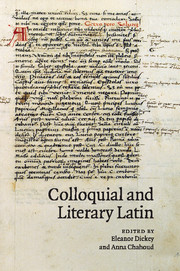Book contents
- Frontmatter
- Contents
- List of contributors
- Acknowledgements
- Foreword (David Langslow)
- PART I THEORETICAL FRAMEWORK
- PART II EARLY LATIN
- PART III CLASSICAL LATIN
- PART IV EARLY PRINCIPATE
- PART V LATE LATIN
- 22 Late sparsa collegimus: the influence of sources on the language of Jordanes
- 23 The tale of Frodebert's tail
- 24 Colloquial Latin in the Insular Latin scholastic colloquia?
- 25 Conversations in Bede's Historia Ecclesiastica
- Abbreviations
- References
- Subject index
- Index verborum
- Index locorum
24 - Colloquial Latin in the Insular Latin scholastic colloquia?
Published online by Cambridge University Press: 04 April 2011
- Frontmatter
- Contents
- List of contributors
- Acknowledgements
- Foreword (David Langslow)
- PART I THEORETICAL FRAMEWORK
- PART II EARLY LATIN
- PART III CLASSICAL LATIN
- PART IV EARLY PRINCIPATE
- PART V LATE LATIN
- 22 Late sparsa collegimus: the influence of sources on the language of Jordanes
- 23 The tale of Frodebert's tail
- 24 Colloquial Latin in the Insular Latin scholastic colloquia?
- 25 Conversations in Bede's Historia Ecclesiastica
- Abbreviations
- References
- Subject index
- Index verborum
- Index locorum
Summary
During the early Middle Ages, ecclesiastical legislation required of all monks that they converse in Latin (during those few hours of the day when conversation was permitted). There was accordingly a strong incentive to learn to speak Latin properly; and this knowledge, once acquired, brought an additional benefit, namely that it facilitated travel for the Latin-speaking monk, enabling him (for example) to seek food and lodging from foreign monasteries as he journeyed from non-Latin-speaking countries such as Ireland, Britain or Germany, through the former Latin-speaking provinces of Gaul and Italy, on the pilgrims' route to Rome. Spoken Latin was learned by means of conversational manuals known as colloquia (the name was apparently coined by the great German humanist Beatus Rhenanus (1485–1547), better known to classical scholarship as the editor of Tacitus and discoverer of Velleius Paterculus). These colloquia consist of imagined conversations in syntactically simple sentences, framed so as to inculcate the vocabulary necessary for conducting the business of daily life. They constitute an interesting, but minor – and accordingly neglected – genre of Latin literature.
THE HISTORY OF SCHOLASTIC COLLOQUIA
The history of scholastic colloquia has never been written, and this is not the place to attempt it; but a few general remarks may be helpful by way of introduction to the text which will form the focus of this study. Broadly speaking, there were three periods of creative activity when imagination and effort were expended in the composition of scholastic colloquia.
- Type
- Chapter
- Information
- Colloquial and Literary Latin , pp. 406 - 418Publisher: Cambridge University PressPrint publication year: 2010

